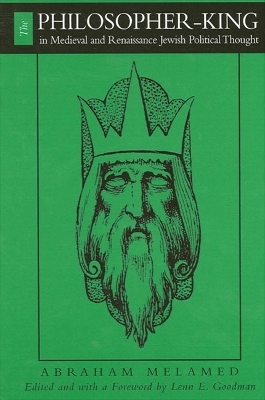
The Philosopher-King in Medieval and Renaissance Jewish Political Thought
Seiten
2002
State University of New York Press (Verlag)
978-0-7914-5568-5 (ISBN)
State University of New York Press (Verlag)
978-0-7914-5568-5 (ISBN)
Illustrates Plato’s theory of the philosopher-king in the context of medieval and Renaissance Jewish thought.
This original treatment of medieval and Renaissance Jewish thinkers expands the scope of Jewish philosophy and adds new depth to our understanding of Jewish culture of the period. While medieval Christian political philosophy was based on Aristotle's Politics, Muslim and Jewish philosophy adhered to the Platonic tradition. In this book, Abraham Melamed explores a major aspect of this tradition—the theory of the philosopher-king—as it manifested itself in medieval Jewish political philosophy, tracing the theory's emergence in Jewish thought as well as its patterns of transmittal, adaptation, and absorption. The Maimonidean encounter with the theory, via al-Farabi, is also examined, as is its influence upon later scholars such as Felaquera, ibn Latif, Narboni, Shemtov ibn Shemtov, Polkar, Alemanno, Abarbanel, and others. Also discussed is the influence of Averroe's commentary on Plato's Republic, and the Machiavellian rejection of the theory of the philosopher-king and its influence upon early modern Jewish scholars, such as Simone Luzzatto and Spinoza, who rejected it in favor of a so-called "Republican" attitude.
This original treatment of medieval and Renaissance Jewish thinkers expands the scope of Jewish philosophy and adds new depth to our understanding of Jewish culture of the period. While medieval Christian political philosophy was based on Aristotle's Politics, Muslim and Jewish philosophy adhered to the Platonic tradition. In this book, Abraham Melamed explores a major aspect of this tradition—the theory of the philosopher-king—as it manifested itself in medieval Jewish political philosophy, tracing the theory's emergence in Jewish thought as well as its patterns of transmittal, adaptation, and absorption. The Maimonidean encounter with the theory, via al-Farabi, is also examined, as is its influence upon later scholars such as Felaquera, ibn Latif, Narboni, Shemtov ibn Shemtov, Polkar, Alemanno, Abarbanel, and others. Also discussed is the influence of Averroe's commentary on Plato's Republic, and the Machiavellian rejection of the theory of the philosopher-king and its influence upon early modern Jewish scholars, such as Simone Luzzatto and Spinoza, who rejected it in favor of a so-called "Republican" attitude.
Abraham Melamed is Professor of Jewish Philosophy at the University of Haifa.
Foreword
Preface
1. Philosopher, King, Prophet
2. The Sources
3. First Influences
4. The Class System
5. Transmission
6. Adaptation
7. Application
8. Christian Applications and the Machiavellian Revolution
9. Rejection
Afterword
Appendix: The Hebrew Versions of the Philosopher King's Virtues
Notes
Bibliography
Index
| Erscheint lt. Verlag | 24.10.2002 |
|---|---|
| Reihe/Serie | SUNY series in Jewish Philosophy |
| Vorwort | Lenn E. Goodman |
| Zusatzinfo | Total Illustrations: 0 |
| Verlagsort | Albany, NY |
| Sprache | englisch |
| Maße | 152 x 229 mm |
| Gewicht | 390 g |
| Themenwelt | Geschichte ► Teilgebiete der Geschichte ► Religionsgeschichte |
| Geisteswissenschaften ► Philosophie ► Philosophie des Mittelalters | |
| Geisteswissenschaften ► Religion / Theologie ► Judentum | |
| ISBN-10 | 0-7914-5568-8 / 0791455688 |
| ISBN-13 | 978-0-7914-5568-5 / 9780791455685 |
| Zustand | Neuware |
| Haben Sie eine Frage zum Produkt? |
Mehr entdecken
aus dem Bereich
aus dem Bereich
Herkunft, Blüte, Weg nach Osten
Buch | Hardcover (2024)
C.H.Beck (Verlag)
CHF 55,90
Von den Anfängen bis zur Gegenwart
Buch | Hardcover (2022)
C.H.Beck (Verlag)
CHF 47,60
warum die Religionen erst im Mittelalter entstanden sind
Buch | Hardcover (2024)
C.H.Beck (Verlag)
CHF 53,20


